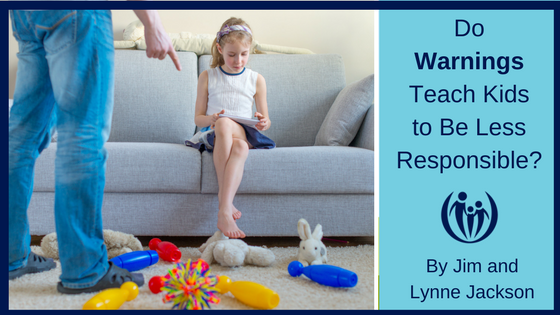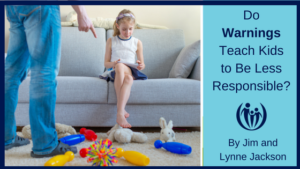
Do Warnings Teach Kids to Be Less Responsible?
When dealing with a misbehaving child, many parents follow this pattern: instruction, warning, warning, last warning, really strong last warning, angry explosion!!
When we stretch out our instructions into multiple warnings and don’t follow through, it teaches our children to feel insecure under our guidance. If a child gets lots of warnings because a parent wants to avoid the hard work of following through, that selfishness can even decrease a child’s trust in their parent as safe and predictable.
Clear instructions, with clear consequences and predictable, stable follow-through, can be one of your most powerful tools for teaching your children to honor your requests. When you are predictable in what you say and do, it teaches your children to understand the cause and effect of consequences and helps them to grow more responsible for their actions.
Instead of warnings, try this approach:
- Connect first – Slow down and look your child pleasantly in the eye. A touch on the shoulder, some affection or encouragement can help prepare your child to really listen.
- Give the instruction – simply and clearly.
- Invite your child to repeat the instruction so you know they’ve heard it.
- Explain the consequences if they do follow or don’t follow the instruction. E.g. “If you finish your homework you can have some computer time, but if not there will be no computer.”
- Let the child decide their response – with NO warnings!
- Follow through calmly with the results of whatever the child chose. Do not allow yourself to get caught up in negative emotions or outbursts even if the child works hard to pull you in. Keep it clear and calm. Earn trust by following through.
If you’ve been in the multiple warning pattern, this new approach may not go so well at first. But as kids get accustomed to your predictability and begin to feel more secure, they are far more likely to begin honoring your requests. By making a clear instruction part of your discipline strategy, you will teach children important lessons about taking responsibility for their decisions and the consequences that come with them.
What are your parenting strengths?
You’ve got them. Knowing your strengths will help you become the best parent you can be. Knowing your parenting challenges is useful information too. Take our FREE ASSESSMENT.


